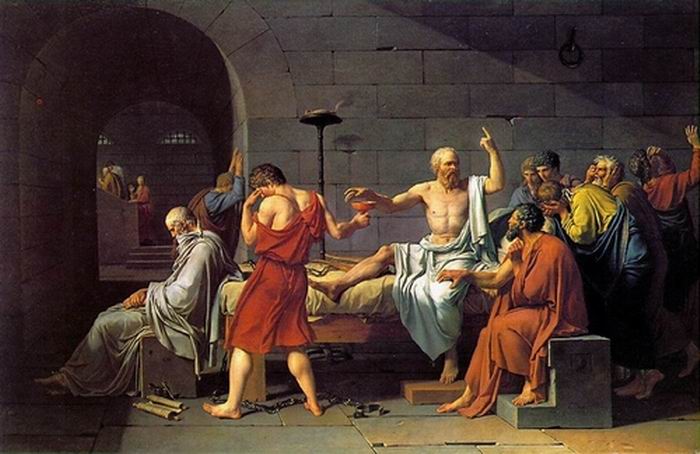March 31, 2005
Leo Strauss & political philosophy #2
I mentioned in this post that in his essay, 'What is Political Philosophy', Leo Strauss' response to the hegemony of positivism and historicism in the mid 20th century was to return to the classical political philosophy, and then to defend it against the political philosophy of modernity.

Jacques-Louis David, Death of Socrates, 1787
Strauss takes the classical philosophers seriously. He challenges modern historicism by arguing that we try to understand the classical philosophers as they understood themselves. And that is my problem with Strauss. I cannot see how we can do that. I can only approach the classics from where I am now. There are no skyhooks to lift me out of the present back into the past.I simply cannot dump all my modernist assumptions and think how Aristotle thought.
That is a different argument to the conventional conservative view that leftists today are obliged to denounce Great Books curricula, because wy know, consciously or unconsciously, that classical thought is very much alive and is a real threat to them. Not so. People should read classical political philosophy and engage with it.
I can however accept that the Straussians hold that premodern philosophy is better than modern philosophy and that they are pre-modern and anti-modern in the name of reason, of philosophy: an understanding of reason and philosophy that is different from the Enlightenment's.
Strauss argues that contemporary liberalism is the logical outcome of the philosophical principles of modernity, taken to their extremes. Liberalism, as practiced in the advanced nations of the West in the 20th century, contains within it an intrinsic tendency towards relativism, which leads to nihilism.
I accept that the implication of the argument we should free ourselves from the narrowness of the modern perspective and step back from the distortions and corruptions of modernity.But that does not necessarily mean a return to the ancient point of view towards political affairs. We can go post modern as well as premodern, and go post modern through re-reading the classics.
I can also accept that philosophy calls into question the conventional morality upon which civil order in society depends; it also reveals ugly truths that weaken men’s attachment to their societies. Ideally, it then offers an alternative based on reason, but understanding the reasoning is difficult and many people who read it will only understand the "calling into question" part and not the latter part that reconstructs ethics.
Leo Strauss,therefore, revives the quarrel between the ancients and the moderns when he calls for a return to and a renewal of ancient political philosophy, and in particular that of Plato. Though Strauss argues that he has recovered the original Plato lost sight of by the tradition of Neo-Platonic and Christian interpretation Strauss has not recovered the original Plato, but gives a particular reading of Plato.
Posted by Gary Sauer-Thompson at March 31, 2005 07:58 AM | TrackBack